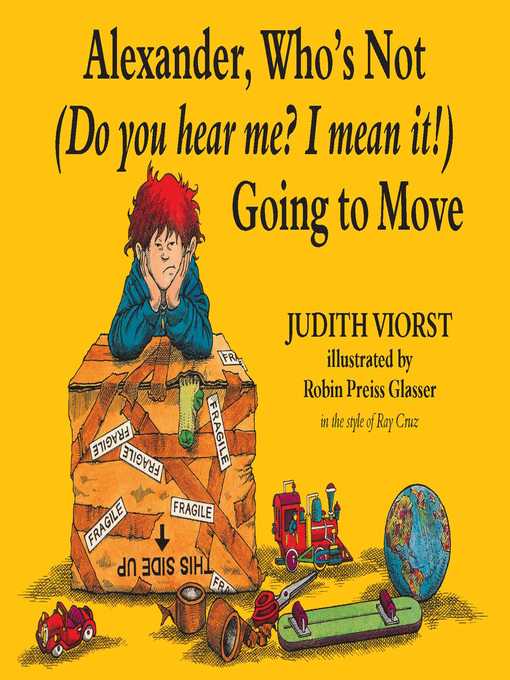
Alexander, Who's Not (Do You Hear Me? I Mean It!) Going to Move
Alexander
فرمت کتاب
ebook
تاریخ انتشار
2012
Lexile Score
550
Reading Level
2-3
ATOS
3.5
Interest Level
K-3(LG)
نویسنده
Ray Cruzشابک
9781442463189
کتاب های مرتبط
- اطلاعات
- نقد و بررسی
- دیدگاه کاربران
نقد و بررسی

Ms. Howard - to leaning to what people saying

October 2, 1995
Twenty-three years after Alexander's first appearance, in Alexander and the Terrible, Horrible, No Good, Very Bad Day, the hapless character makes a gratifying return... with a new gripe. His family is moving 1000 miles away and he does not want to go: "Never. Not ever. No way. Uh uh. N.O." Roaming the neighborhood, he takes a look at his "special places" and bids good-bye to all his "special people," announcing that "I'm saying good-bye-but it won't be my last." By story's end-after he lets some reassuring promises from his parents sink in-Alexander softens his tone, conceding that he, too, is packing up his things, but for the final time. Because next time his family relocates, "I'm not-DO YOU HEAR ME? I MEAN IT!-going to move." Alexander's voice belongs at once to him alone and to every child. Glasser admirably fulfills her stated mission to illustrate this tale "in the style of" Ray Cruz, the artist for the previous Alexander books. Her black-and-white drawings comically capture real events as well as those that occur only in Alexander's animated imagination. Facial expressions and body language are right on target. Hope Alexander finds a new complaint. Soon. Ages 5-8.

Starred review from October 1, 1995
PreS-Gr 3-Alexander is back. This time he refuses to move 1000 miles away from his best friend, his soccer team, and the cleaners that saves gum wrappers and old teeth if he leaves them in his pockets. He is sure he can stay, perhaps with the family that has six girls and needs a boy, or with the older couple that has a dog. As friends give Alexander going-away presents and his parents suggest that he might be able to call long distance on occasion and maybe even get a dog, he begins to pack. This Alexander shows a different emotion from the angry child in ...the Terrible, Horrible, No-Good Very Bad Day (1972), or the sad one ...Who Used to be Rich Last Sunday (1978, both Atheneum). This defiant Alexander is positively not going to move, "No Way. Uh uh. N.O." Pen-and-ink drawings in the style of Ray Cruz's work bond readers to this new Alexander while adding to the story. Youngsters will enjoy the range of feelings here. They will relate to the older brothers' teasing even as they laugh at the humor, will heartily support Alexander's rebellion against his parents, and will also appreciate the adults for letting him come around on his own terms. A terrific read-aloud and a must-buy for every collection.-Betty Teague, Blythe Elementary School, Greenville SC

Starred review from August 1, 1995
Gr. 4^-8. Alexander in Viorst's classic 1972 story was having a very bad day. Now he's snarling and scowling because he has to move; his father has a new job 1,000 miles away. Alexander swings between anguish and fury. He will not move. He won't pack. His parents try to be sympathetic; his brother Nick calls him a puke face; his brother Anthony says he's immature. Alexander broods about what he'll miss. He remembers. He fantasizes that he'll hide and stay behind. The detail of the crosshatched drawings, the particularity of the examples, the cadence of the child's voice, express the depth of his feelings. He's bowed with sorrow when he has his last school lunch with his best friend: we see that Alexander's sandwich is untouched. Then gradually, a few images of the new home creep in. Dad promises Alexander a dog, and reluctantly he begins to pack. This story of being uprooted is being told in children's books all the time now, but there's a rare combination here of farce and immediacy and a wonderful empathy for the child's point of view. Alexander just can't bear it. Kids will laugh at the wild exaggeration even as they recognize his heartfelt grief. ((Reviewed August 1995))(Reprinted with permission of Booklist, copyright 1995, American Library Association.)

























دیدگاه کاربران